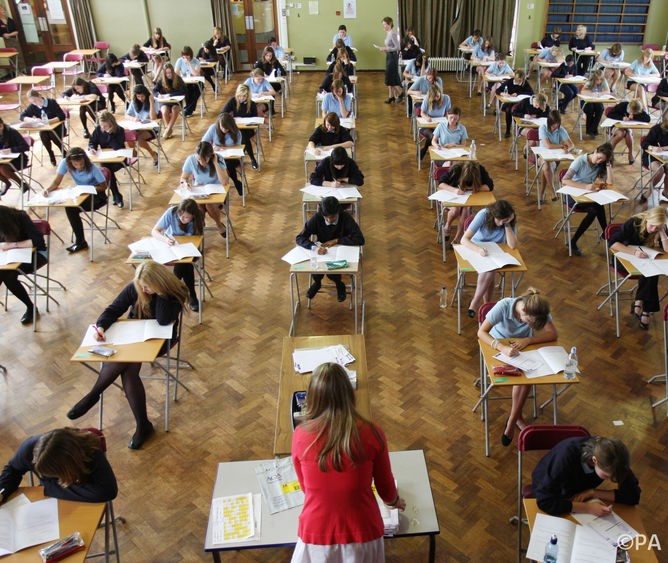By Emily Caulkett-
GCSE students have been told to brace themselves for disappointing results on Thursday as the Government’s attempts to combat grade inflation will likely mean a drop in top marks and a surge in appeals
The exam watchdog has been instructed to put a ceiling on the number of top grades this year after results broke records in 2021 when they were based on teacher assessments during the pandemic.
The implication could see the number of results marked Grade 7 or above, the equivalent of A or A*, fall by a record 230,000 this year, according to analysis by Professor Alan Smithers, head of the Centre for Education and Employment Research.
The headteacher’s union have warned that GCSE results will be uneven across the country due to the varying impact of the pandemic, according to the headteachers union.
Students who sat GCSE exams this year are said to have been gripped by anxiety, panic attacks and insomnia, according to headteachers.
The number of grades that fall below the standard pass mark, or those marked Grade 3 and below, is expected to jump by around 260,000.
Grade 4 or above, equivalent to the former C grade, is required in both subjects for most apprenticeships, jobs and university degrees.
This year’s GCSE results are expected to see over a third of students fail to achieve the required grades in English and Maths, just as in 2019, when grades in the critical subjects fell below par.
He suggested that even a marginal drop in grades this year could spark a national conversation about education reform, especially given that James Cleverly is likely to be replaced as Education Secretary once a new Prime Minister is announced in two weeks’ time.
“I do think we need a rethink on education policy because the system at the moment is failing a lot of our children, and that’s not good for social mobility,” he said.
“A scandalously high proportion of young people leave school without basic English and Maths. I hold onto the hope that the pandemic and its impacts will open up wider and more fundamental debates about these issues which have plagued the system for decades.”
The Government has faced growing calls for an education shake-up in recent weeks, with experts arguing that a return to normality after two years of no exams during the pandemic could prove a ripe opportunity for change.
The Tony Blair Institute published a report earlier today urging the Government to scrap GCSEs and A-levels because they leave children “poorly prepared for work”.
The former prime minister argued that current qualifications “do far too little” to meet the needs of the modern working world and that employers are “increasingly disgruntled by what they are seeing”.
Among those who reached the expected attainment levels, 40 per cent of disadvantaged students achieved good GCSEs in English and Maths compared with 60 per cent among the rest of the population.
Dr Breslin, author of Lessons from Lockdown: The Educational Legacy of Covid-19, said disappointing GCSE results for thousands on Thursday should act as a wake-up call for ministers.
“If the grades are tougher on Thursday, maybe that might be a catalyst to think about how we can get beyond grades,” he said. “When there is a system shock is the opportunity for change, and we’ve had a real shock to our education system during the pandemic.”
“We’ll also see that in the appeals process this year. Whenever you find that there’s a sort of complexity or ambiguity in a process, those who know how to work the system benefit from that.”
Mr Hobby said it was vital that universities and employers take into account both grade deflation and the effects of the cost of living crisis when considering this year’s cohort for jobs and degrees.
“It does need to be really clear that young people who emerge with lower GCSE results this year [represent] a statistical change rather than the fact that they’ve underperformed, because remember there will be people from last year competing who did better,” he said.
“We’re also potentially going to see a widening of gaps because of the cost of living crisis. I do fear that inequalities will be sharpened… so I think we do need to pay attention to what tomorrow’s problems will be. They’re right on our doorstep.”




